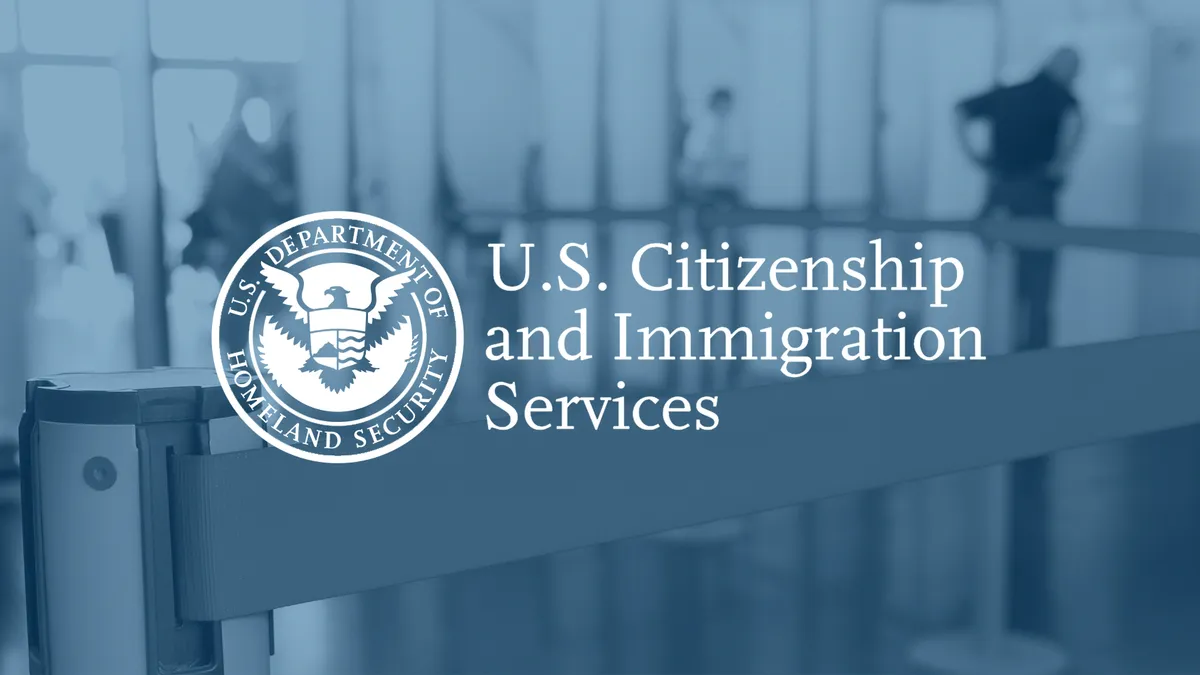Dive Brief:
- The U.S. Citizenship and Immigration Services (USCIS) office sent a proposal to Congress for funding that includes a potential 10% surcharge to USCIS application fees, according to details emailed to HR Dive. "Due to the COVID-19 pandemic, USCIS has seen a dramatic decrease in revenue and is seeking a one-time emergency request for funding to ensure we can carry out our mission of administering our nation's lawful immigration system, safeguarding its integrity and protecting the American people," a USCIS spokesperson told HR Dive in an email May 20.
- USCIS notified Congress of a projected budget shortfall caused by the pandemic May 15. The proposal sent to Congress included a request for $1.2 billion in funding over a two-year period to prevent disruption in operations, including the surcharge. "This funding proposal protects American taxpayers by not adding to the deficit and requiring USCIS to pay the money back to the U.S. Treasury," the USCIS spokesperson said.
- The agency estimated that application and petition receipts will drop by about 61% through the end of fiscal year 2020 and that funding will be exhausted this summer. USCIS temporarily suspended routine in-person services March 18 to help slow the spread of COVID-19. The agency plans to begin reopening offices on or after June 4, "unless the public closures are extended further," according to USCIS's website.
Dive Insight:
The possibility of an additional 10% surcharge on USCIS application fees, might not sit well with U.S. tech companies that employ workers on H-1B visas and have accused the agency of exorbitant charges.
ITServe Alliance filed a lawsuit against USCIS in January alleging the agency illegally accumulated millions in border fees by charging a $4,000 fee for H-1B applications for professionals who extended their visa status while inside the U.S. The alliance argued the fee should only be charged when the employee enters the country. ITServe requested USCIS to "pay restitution or refunds in the actual amount of unlawful fees collected for the past six years from today or back to January 14, 2014," the lawsuit stated.
In March, a federal judge consolidated ITServe's complaints and invalidated a set of USCIS guidance documents that allegedly slowed the H-1B visa approval process, and resulted in a high level of rejected visa petitions for tech industry employers. The USCIS agreed to a settlement with ITServe Alliance signed May 16, according to documents obtained by the National Foundation for American Policy, a nonpartisan public policy organization. As a part of the settlement, the USCIS will rescind its 2018 Contract and Itinerary memorandum, which required companies to provide detailed documentation while an employee is working at a third-party to ensure that it's a legitimate employer-employee relationship.
Employers who employ H-1B visa holders recently experienced some difficulties with USCIS systems. There were reported technical glitches in April with the agency's electronic registration system, which allows employers to apply for H-1B visas for the 2021 fiscal year. In February, a group of business executives called on policymakers to streamline the H-1B visa application and approval process. Employers, particularly in the tech industry, have said they face talent shortages as the Trump administration tightened up the H-1B visa process in recent years.














